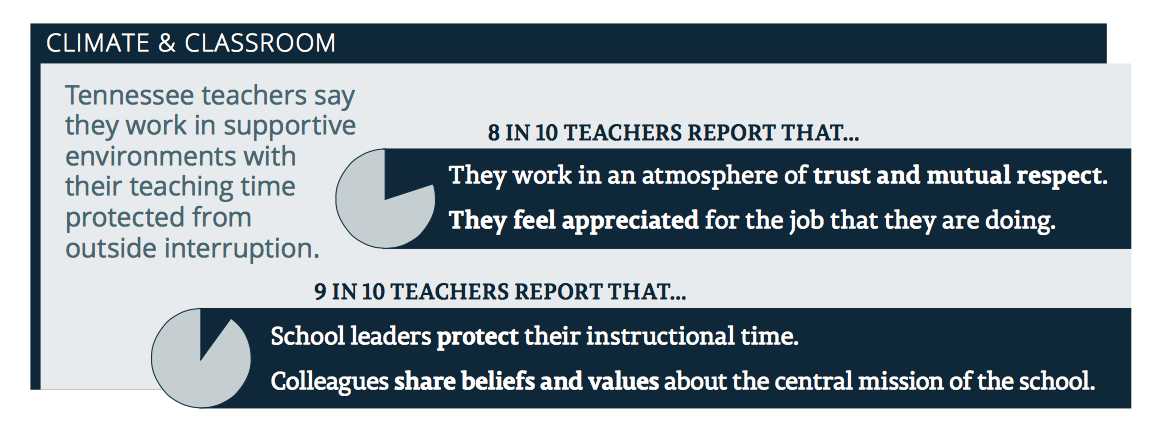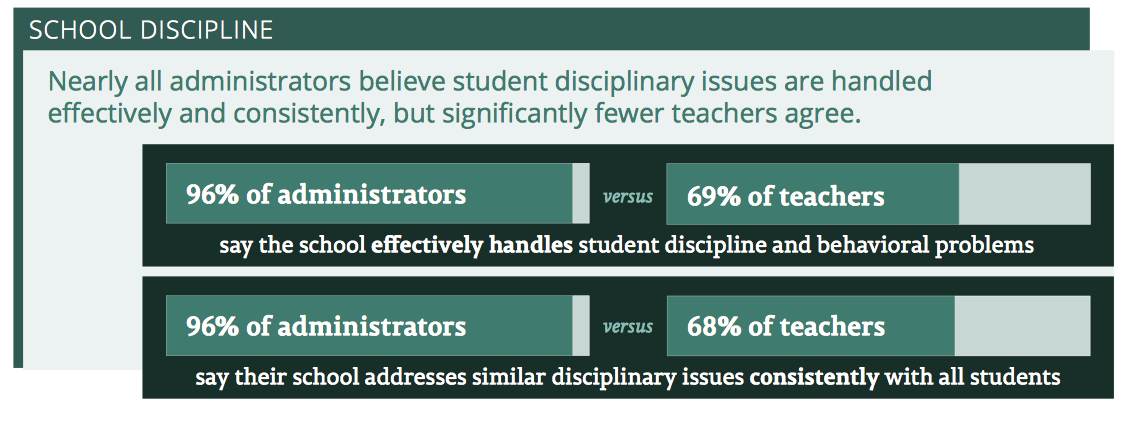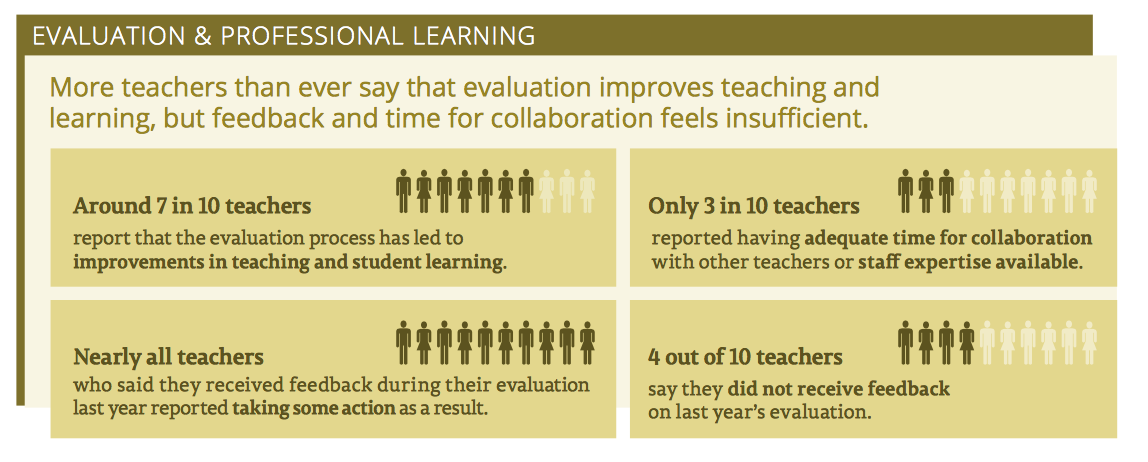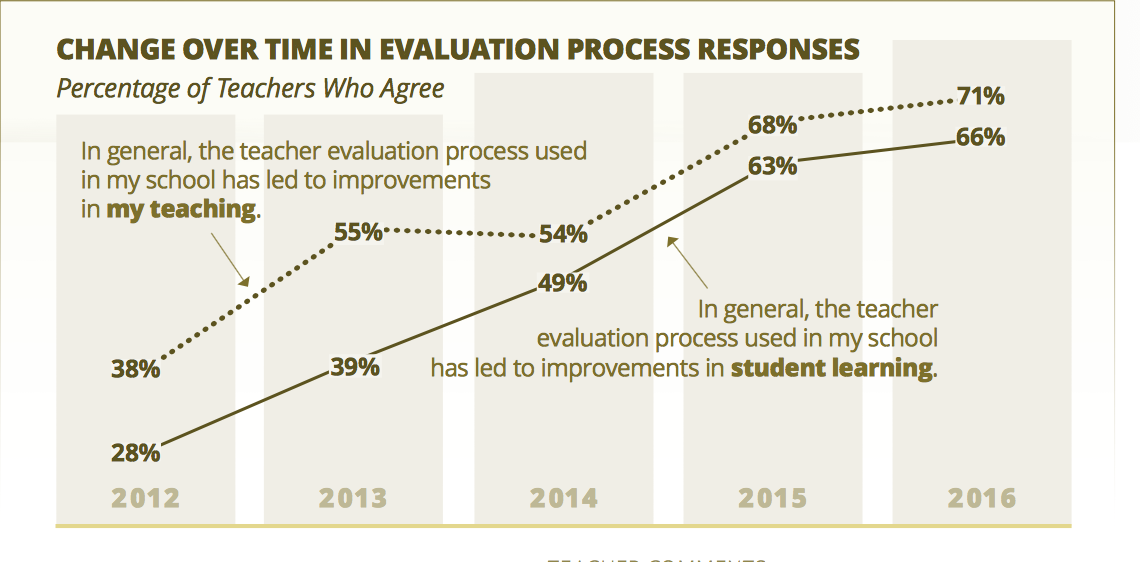The Tennessee Department of Education released the results of their annual educator survey. The 2016 Educator Survey was taken by over 30,000 educators across the state, which is about half of the state’s educators. This large sample of teachers allows us to see what teachers are really feeling out in the trenches, and the vast majority of teachers feel appreciated.
Working Conditions
Throughout the country we hear that many teachers do not feel appreciated as a teacher. But Tennessee’s classroom climate is different. 78% of teachers say: “I feel appreciated for the job that I am doing.”
The graphic below shows that Tennessee’s teachers give high ratings to their working conditions and to their colleagues.

It should be noted that “we still see about 10 percent of schools across the state where the majority of staff report that they are dissatisfied with their work environment.” I hope that those schools are aware of their teacher’s views on the work environment. In Nashville, the district uses the TELL survey data to get a glimpse of how teachers view their working environment and administration.
My middle school in Nashville reviews the TELL survey results each year, discusses those results with their teachers, and makes necessary adjustments based that feedback. It’s a process that I hope all schools are doing in Nashville.
Student Discipline
The next area of the Educator Survey was about student discipline. This was the area that teachers and administers really disagreed on, as you can see below. Teachers also believe that we need to be spending more professional development on how to address student’s non-academic needs.


As a teacher, I can really understand the disagreement between administrators and teachers on this issue. Chalkbeat easily breaks down the issue:
Tennessee teachers are more concerned than principals about discipline at their schools, according to a new survey that shows a similar disconnect over the amount of feedback that teachers get from their administrators.
About 69 percent of teachers surveyed say their schools effectively manage student behavioral problems, while 96 percent of administrators say their schools handle discipline just fine.
The gaps in perception suggest that school administrators may not be aware of their teachers’ concerns on discipline.
The findings come as high suspension rates for poor students and students of color are getting more national attention. They also indicate that Tennessee needs to start making discipline policies a bigger priority, says Education Commissioner Candice McQueen.
“This points to specific areas where we need to take more concrete actions,” McQueen said during a conference call with reporters. She added that teachers are asking for more support to meet their students’ non-academic needs.
Teacher Evaluation
More teachers than ever before say that the teacher evaluation system is improving teaching and student learning. That’s great to hear.

The results show that 71% of teachers saw improvement in teaching thanks to the teacher evaluation process. Personally, I had a great evaluator last year and my teaching skills grew because of it. I have really grown as a teacher over the last two years thanks to the teacher evaluation system.
This year’s result is a huge increase from 2012.
Seventy-one percent of teachers report that the teacher evaluation process has led to improvements in their teaching, up from 38 percent in 2012. Similarly, two- thirds of all teachers report that the process has led to improvements in student learning, up from about one quarter in 2012.
What do teachers want more of? Collaboration, of course! I work at a school with a really collaborative nature, and it shows both in the teachers and in the students.
Change Over Time
I really enjoyed looking at the chart below to see how the teacher’s responses have changed over time on the evaluation process. This chart shows that a over two-thirds of teachers believe that the teacher evaluation improves their teaching and student learning.

Tennessee is on the right course toward making teachers feel appreciated, and it’s great to see the teacher evaluation process improving teaching performance. Let’s not stop now. I hope the Department of Education will use these results to continue to improve the teaching environment for Tennessee’s teachers.
You can read the full report here.
For more on education politics and policy in Tennessee, follow @TNEdReport.




